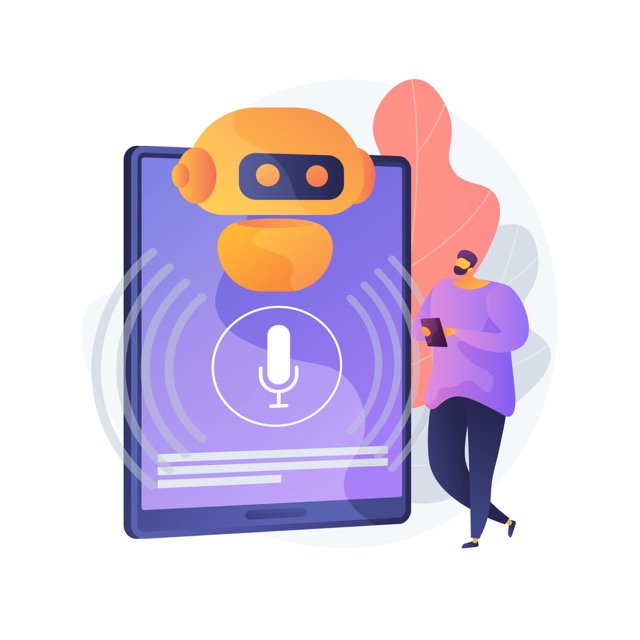Founded in Denmark. We respect your privacy.
Join a worldwide community of language learners
How AI-Language Practice Stacks Up Against Online Tutor Services: An In-Depth Comparison
By Conor Monaghan
In the world of language learning, AI and human tutors are battling it out for the top spot. Who will come out on top?
AI-powered apps offer cutting-edge speech recognition and instant feedback. Meanwhile, online teaching platforms provide the personal touch of learning from a real person.
Let's explore this rivalry and see whether AI or humans are the superior language practice partner.
AI Language Tutors Overview
Your journey into the world of AI language tutors will highlight how technological innovations are revolutionizing language learning. AI provides you with personalized, accessible, and effective language practice.
Defining AI Language Practice
AI language practice refers to the use of artificial intelligence to facilitate language learning. Unlike traditional learning approaches, AI language practice allows you to engage in simulated conversations and receive immediate feedback on your language use.
AI tutors are structured to recognize speech patterns and provide corrections to your pronunciation, grammar, and usage.
They can also tailor exercises to address your specific language skill gaps, making the practice highly relevant and focused on your needs.
Comparing AI Tutors and Human Tutors
When exploring language learning, you may find yourself choosing between AI tutors and human tutors, each offering distinct approaches.
Teaching Methodologies
AI Tutor: Your AI tutor uses algorithms to guide the learning process, adapting content based on your performance. Essential skills, like vocabulary and grammar, are often taught through repetitive practice and pattern recognition.
Human Tutor: In contrast, a human tutor might alter their strategy on-the-fly, considering your emotional and motivational state. They provide an intuitive approach, often driven by your learning styles and preferences, which might include storytelling or role-playing to enhance the learning experience.
Personalization in Learning
AI Tutor:
- Pros: Provides a highly personalized learning experience by analyzing vast amounts of your interaction data.
- Cons: May lack the nuanced understanding of personalized learning that adapts to the subtleties of your personal and cultural context.
Human Tutor:
- Pros: Offers personalized attention with a deep understanding of your unique challenges and can modify lessons to fit cultural references and current events that resonate with you personally.
- Cons: Such personalized attention may vary significantly depending on the tutor's experience and expertise.
Feedback and Corrections
AI Tutor: Delivers immediate feedback which is particularly effective for objective types of exercises, such as multiple-choice questions or fill-in-the-blanks.
Human Tutor: Provides tailored feedback and corrections, which can be essential for the nuances of language like pronunciation and conversational skills. They can also give you detailed explanations and constructive criticism that AI might not be equipped to offer.
Advantages of AI-Language Tutoring
AI language tutoring is transforming the way you learn languages, offering distinct advantages over traditional online tutor services.
Availability and Flexibility
One of the most significant benefits of an AI language tutor is that it is available 24/7, allowing you to practice your language skills whenever your schedule permits. This kind of flexibility means that your learning is not confined to the availability of a human tutor, making it ideal for learners with busy or unpredictable schedules.
Instant Feedback and Confidence Building
As you interact with an AI language tutor, you receive instant feedback on your pronunciation, grammar, and vocabulary. This immediate response can accelerate your learning process and help build your confidence as you instantly see areas for improvement and validate your mastery of language components.
Inclusive and Adaptive Learning
AI language tutors cater to a diverse range of learning needs by providing inclusive and adaptive learning environments. They can modify instruction style and content based on your performance, ensuring that the education you receive is tailored to your strengths and weaknesses, thus making the learning experience more effective.
Talkio AI
Talkio AI is an innovative example of an AI language tutor designed to guide you through language acquisition. It leverages machine learning algorithms to personalize the education journey, adapting to your unique learning curve and providing a comprehensive understanding of the language.
Challenges and Limitations of AI Tutors
While AI tutors offer innovative opportunities for language learning, you should be aware of several challenges and limitations that can affect their effectiveness.
Understanding Nuance and Emotion
AI tutors might lag in interpreting nuances of language and emotional subtleties. Despite advancements in natural language processing, AI often struggles with understanding context, idioms, and cultural references that are intuitive to human tutors. Your learning experience could be impacted when you encounter complexities such as sarcasm or humor, which AI might not accurately detect or teach.
Human Interaction and Real-Life Conversations
- The aspect of human interaction is critical for language learning, as it fosters negotiation of meaning and sociolinguistic competence.
- Real-life conversations involve a dynamic exchange where body language and tone play a significant role. AI tutors, while improving, may not provide you with the nuanced feedback you would get from interactions with a live tutor.
Bias and Ethical Considerations
- AI systems can reflect and even amplify existing biases in their algorithms, which are often a result of the data they are trained on.
- Ethical considerations also arise if these systems lack transparency or if your data is not handled with confidentiality.
Technologies Enabling AI Tutoring
In the realm of AI language practice, technologies such as Talkio AI, sophisticated speech and voice recognition systems, and Conversational AI and chatbots, have revolutionized the way you learn languages. Each element plays a crucial role in emulating the benefits of online human tutor services.
Talkio AI
Talkio AI represents a leap in language learning apps by providing an interactive interface where you can engage in real-time conversations.
Designed to simulate natural dialogue, Talkio AI integrates conversational AI capabilities that assess your language proficiency and tailor conversations accordingly.
This AI tool not only evaluates your responses but also adapts to your learning pace, which can be particularly useful when compared to the fixed curriculum of some language learning apps like Duolingo.
Speech and Voice Recognition
Speech and voice recognition technology is a cornerstone in language practice, enabling you to receive immediate feedback on your pronunciation and fluency.
This voice technology utilizes advanced algorithms to process your spoken words, compare them to native speech patterns, and offer corrective suggestions. Here's how it integrates:
- Accuracy: Breaks down your phonetic pronunciation to match with native speakers.
- Intonation: Monitors your tone and stresses in speech for natural-sounding dialogue.
Conversational AI and Chatbots
Lastly, Conversational AI and chatbots act as your 24/7 language practice partners.
Beyond generic responses, these chatbots harness the power of machine learning to lead dynamic conversations, guiding you through complex language constructs. They mimic a real tutor's ability to converse and correct, thus providing:
- Engagement: Real-time interaction that keeps you active and involved in the learning process.
- Contextual Learning: Understands and responds to sentences within the context of the conversation, much like interacting with a human tutor.
Impact on Language Education
In navigating the evolving landscape of language education, you will encounter AI-based solutions that are redefining traditional methodologies. These tools, fueled by advancements in technology, potentially streamline the learning process, providing targeted instruction and immediate feedback.
AI as Supplement or Replacement
AI language platforms offer a range of services that can serve as a supplement to or, in some cases, a replacement for online tutor services.
Supplementary AI tools function alongside human instruction, providing you with additional practice and exposure to the language outside of tutor-led sessions. These platforms often feature:
- Personalized learning paths based on your proficiency and goals.
- Instant feedback on exercises, enabling you to correct errors in real time.
Conversely, AI may stand in as a replacement when human tutors are inaccessible, offering:
- 24/7 availability, allowing you to practice regardless of schedule or location.
- A vast array of learning materials at varying difficulty levels, adaptive to your progress.
- Interactive conversation bots, simulating real-life conversations.
Future of Learning Languages
Looking ahead, the future of learning languages with AI suggests an increasingly personalized and accessible education experience. Key features likely to shape this future include:
- Adaptive learning environments that respond to your evolving language skills.
- Enhanced natural language processing (NLP) capabilities for more nuanced understanding and instruction.
- Sophisticated speech recognition to improve your pronunciation through precise, nuanced feedback.
Real-World Implementations
In exploring how AI language practice stacks up against online tutor services, you'll want to consider the application in real-world settings, noting how implementation, user experience, and interfaces play pivotal roles in effectiveness.
Improving Language Skills with AI
When you're looking to enhance your language skills, AI-powered tools offer a wealth of resources. You can expand your vocabulary, practice grammar, and improve overall language skills through platforms like Talkio AI and others.
AI enriches your language learning experience by focusing on:
| Feature | Benefit to You |
|---|---|
| Adaptive Content | Targeted progression in vocabulary and grammar |
| Prompt Correction | Real-time feedback hones language skills |
| 24/7 Availability | Learn around your own timetable |
| Linguistic Variety | Access to major and minor languages alike |
Critical Perspectives on AI Language Practice
As you explore the potential of AI in language practice, consider the insights from research and surveys, and evaluate the efficacy and outcomes.
Research and Surveys
In your search for understanding the impacts of AI on language learning, surveys conducted among language educators highlight diverse opinions.
For instance, some educators suggest that a core course on AI literacy should be incorporated into initial language teacher education. They stress the importance of equipping you, as a language learner, with the necessary skills to navigate the AI terrain effectively within the learning process.
- Teacher Views on AI:
- Core AI Literacy Course: Essential for teacher education.
- Subject-Content Integration: AI concepts should be weaved into specific language subjects.
Educators and researchers emphasize the importance of developing a critical AI literacy that caters to the nuanced challenges of AI integration in language education.
Evaluating Efficacy and Outcomes
When assessing the outcomes of AI language practice tools compared to online tutoring services, it is crucial to focus on tangible results.
Studies underline that while AI can support diverse language learning needs and help reduce foreign language anxiety, the effectiveness varies widely among learners.
- Outcomes of AI Use:
- Support for Special Needs: AI can offer tailored solutions.
- Anxiety Reduction: Tools like speech-enabled AI may lessen learner anxiety.
- Personalized Learning: AI adapts to your individual proficiency and learning pace.
You should weigh these outcomes against what can be achieved through human tutoring, considering the personalized feedback and dynamic interaction that a tutor provides.
Frequently Asked Questions
Explore how AI language platforms are revolutionizing the field of language education, offering unique benefits and features that traditional tutoring methods may not provide.
What advantages do AI language tutoring platforms offer over traditional tutoring?
AI language tutoring platforms excel in providing flexibility and personalized learning experiences.
You can access these services anytime and anywhere, which translates to convenience and consistency in practice. They also tend to be more cost-effective compared to one-on-one lessons with human tutors.
What features do AI-driven language learning apps provide to enhance student engagement?
AI-driven language apps often come with interactive features like chatbots, which encourage you to converse actively, ask questions, and learn from your mistakes in a low-pressure environment. Immediate feedback and gamification elements also keep you engaged and motivated.
How do AI tutors adapt to individual learning styles in language practice?
AI language tutors utilize algorithms to analyze your learning patterns and preferences.
This enables them to tailor content and pacing to suit your specific learning style, helping you grasp language concepts more effectively compared to the one-size-fits-all approach of traditional language classes.
Can AI language tutors effectively assess and improve students' pronunciation and fluency?
Yes, many AI language tutors are equipped with speech recognition technology.
This allows them to provide real-time feedback on your pronunciation, as well as suggestions for improvement, which can enhance your speaking skills and overall fluency.
In what ways has AI been integrated into language education to benefit both students and educators?
AI has been integrated into language learning through personalized learning plans, automation of grading and feedback, and providing analytics for educators to track student progress.
This not only aids students in mastering the language but also assists educators in identifying areas that require additional focus.
Are there comprehensive AI tutoring solutions available that cover both grammar and conversational skills?
Yes, comprehensive AI tutoring solutions exist. They are designed to address both grammatical understanding and conversational fluency.
These solutions usually feature a combination of learning modules. These modules include grammar exercises, vocabulary building, and interactive conversation practice.

Conor Monaghan
Conor was an English teacher for 10 years. He is interested in helping people with their English skills and learning about using AI tools at work.


